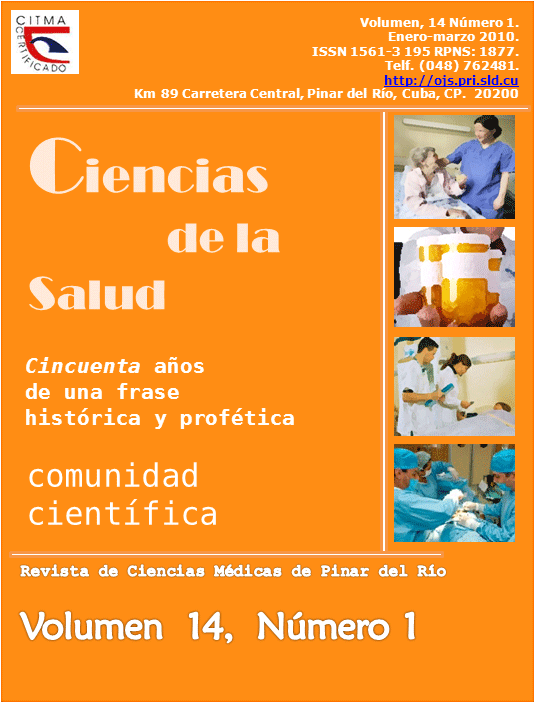Application of the Informed Consent by the dentists in Primary Health Care
Abstract
Bioethics is supported in the principle of autonomy, the respect of the human dignity and it is stated by means of the informed consent; however dentists in Pinar del Rio do not know how to apply it. A descriptive and cross-sectional study was carried out to determine the level of application of the informed consent by the dentists of the Primary Health Care in Pinar del Rio municipality on June 2007, which is considered a matter of vital importance to practice the profession implying the fulfillment of the bioethical principles, mainly the informed consent. Out of a universe of 134 dentists, 100 were included into the research applying a survey and an observation guide. Data were processed using descriptive statistical methods. Findings showed incomplete knowledge about the proper application of the informed consent. The most violated elements were request for the authorization and the incorporation of the patents to decision-making about the treatment to be followed.Downloads
References
1. Pérez Díaz T, Otero Iglesias J. El paradigma biosocial en la atención primaria de salud: reflexiones de un claustro .Revista Habanera de Ciencias Médicas [Revista en línea] 2004 [Acceso 10 julio 2005] 3(9). Disponible en: http://www.ucmh.sld.cu/rhab/articulo_rev9/para_bios.htm
2. Manietti JA. El renacimiento de la Bioética en el siglo XXI. Web odontológica [sitio en Internet] 2002 [Acceso 10 de julio 2005].Disponible en: http://www.webodontologia.com/odon/arti/elrena/bioetica/asp.htlm
3. Mainetti JA. Compendio Bioético. La Plata: Quirón; 2000.
4. Sánchez García Z, Marrero Rodríguez JN, Becerra Peña O, Herrera Calleñas D, Alvarado Peruyero JC. Los principios bioético en la Atención Primaria de Salud: Apuntes para una reflexión. Revista Cubana medicina General Integral [Publicación periódica en línea] 2003. [acceso 16 de Mayo 2006] (19)5 Disponible en: http://www.bioeticaweb/com/content/view/1329 /90.htmlvs.sld.cu/revistas/mgi/vol19_5_03/mgi12503.htm
5. Costa Alcaraz AM, Almendro Padilla C. Los principios de la Bioética: Autonomía. Formación Bioética. [sitio en Internet] 2005 [Acceso el 4 de septiembre 2006]. Disponible en: http://www.fisterra.com/formacion/bioetica/autonomia.asp
6. Hernández Hernández EB. Aproximación al régimen jurídico de la atención farmacéutica. Tesis doctoral. Universidad de Granada. Granada, España. 2006. Editorial de la Universidad de Granada. p.163-175
7. Agranatti P. Bioética en odontología. Odontomarketing. [sitio en Internet], 2(9); 2001[Acceso 28 de Septiembre de 2006] Disponible en: http://www.odontomarketing.com/nuemrosanteriores /ART_18_ENE_2001htm
8. Ministerio de Educación Superior. Plan de Estudio de la Carrera de Estomatología Plan C. La Habana: Ministerio de Educación Superior; 1992.
9. Islas-Saucillo M, Muñoz Cuevas H. El consentimiento informado. Aspectos bioéticos. Revista médica del Hospital General de México, S.S[revista en internet]. 2000 [citado Ene 2009]; 63(4): p. 267-273. Disponible en: http://www.medigraphic.com/pdfs/h-gral/hg-2000/hg004h.pdf
10. Macias Gelabert Alina Mercedes. El consentimiento informado en Pediatría. Rev Cubana Pediatr [revista en la Internet]. 2006 Mar [citado 16 Mayo 2006] ; 78(1): Disponible en: http://scielo.sld.cu/scielo.php?script=sci_arttext&pid=S0034-75312006000100008&lng=es
11. Garbin CAS, Garbin AJI, Saliba NA, Zina LG, Goncalves PE. El Consentimiento Informado en la clínica odontológica. Acta odontol. venez. [Revista en Internet] 2007 [citado 27 Abril 2007]45(19):37-43. Disponible en: http://www.scielo.org.ve/scielo.php?script=sci_arttext&pid=S0001-3652007000100007&lng=es&nrm=iso>. ISSN 0001-6365.
Published
How to Cite
Issue
Section
License
Authors who have publications with this journal agree to the following terms: Authors will retain their copyrights and grant the journal the right of first publication of their work, which will be publication of their work, which will be simultaneously subject to the Creative Commons Attribution License (CC-BY-NC 4.0) that allows third parties to share the work as long as its author and first publication in this journal are indicated.
Authors may adopt other non-exclusive license agreements for distribution of the published version of the work (e.g.: deposit it in an institutional telematic archive or publish it in a volume). Likewise, and according to the recommendations of the Medical Sciences Editorial (ECIMED), authors must declare in each article their contribution according to the CRediT taxonomy (contributor roles). This taxonomy includes 14 roles, which can be used to represent the tasks typically performed by contributors in scientific academic production. It should be consulted in monograph) whenever initial publication in this journal is indicated. Authors are allowed and encouraged to disseminate their work through the Internet (e.g., in institutional telematic archives or on their web page) before and during the submission process, which may produce interesting exchanges and increase citations of the published work. (See The effect of open access). https://casrai.org/credit/



